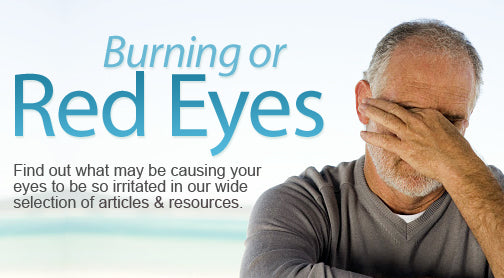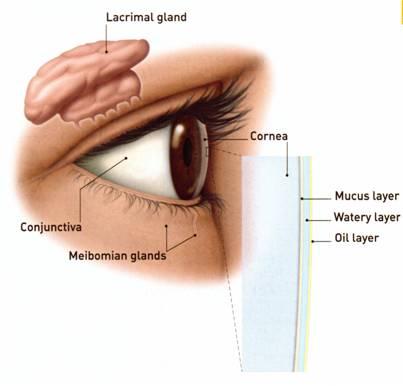Burning eyes are a common eye health complaint. In addition to a stinging sensation, burning eye symptoms may be accompanied by a mucous-like discharge, tear-filled eyes, eye fatigue, weighty-feeling eyelids, moments of blurred eyesight and an uncomfortable sensation that something coarse is in the eye.

Contributing Factors to Burning Eyes
Aging: Aging is associated with decreased tear production, which may lead to symptoms of burning eyes.Allergies: Allergies are a common cause of burning, stinging eyes. Eye allergens ranging from outdoor varieties such as tree pollen to indoor varieties such as pet dander or mold may all be associated with burning eyes. In these cases, the attention of an allergist is required.
Blinking problems: Many experience burning eyes because they don't blink enough, leading to insufficient tear production and poor-quality tear film layers. This often manifests when people become "lost" in a task, such as staring at a computer screen for an extended period, watching television or watching the road while driving.
Inflammation: Chronic inflammation in the eyelid lining and the tear glands is associated with stinging and burning sensations.
Contact lenses: Soft contact lenses can cause moisture to evaporate from the eye rapidly, which often leads to sensations of burning and stinging.
External irritants: Dust, wind, smoke, cleaning chemicals, sweat and other irritating factors can cause eyes to sting and become red. Irritants may also cause temporary blurred vision. Once the tear glands produce enough tears to wash the irritants away, normal sight and eye comfort return.
Dry eye syndrome: When eyes are consistently burning and itching, and no irritants or allergens are involved, dry eye syndrome is the likely cause. In this case, the tear glands don't produce enough moisture to maintain normal eye comfort. Dry eye might also mean that tears are adequate in supply, but lack the proper compounds necessary to make them effective.
Managing Burning Eyes
Eye drops: Many seek relief from burning eyes by using over-the-counter eye drops. However, common complaints are that the drops themselves cause additional stinging and any benefits don't last long. Preservative-free eye drops may be more comfortable for those with sensitivities to artificial tears.Proper contact lens care: Those who experience burning as a result of contact lens wear must take extra steps to ensure their lenses are fresh and clean. Taking an occasional break from wearing lenses may also help to restore eye comfort.
Tear conservation: A type of surgical procedure that plugs the eye's tear drainage channels helps to improve tear film layers and improve eye hydration -- minimizing symptoms of burning and stinging.
Lifestyle changes: Healthy sleep patterns, using a humidifier, drinking enough water, proper allergy care, and face-hugging sunglasses may all help with burning eyes by maintaining eye hydration and comfort.
Nutritional supplementation: Nutritional supplements that support tear production, soothe eye inflammation and promote tear film stability may help to minimize symptoms of burning eyes.














